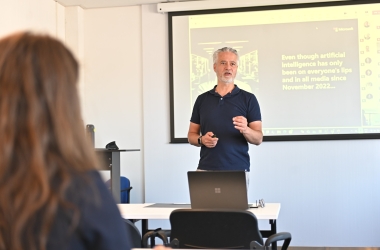Wittenborg Hosts Third Faculty Development Seminar on Microsoft and AI in Education
Wittenborg Hosts Third Faculty Development Seminar on Microsoft and AI in Education

Wittenborg Hosts Third Faculty Development Seminar on Microsoft and AI in Education
Xander Kupers Highlights Microsoft’s Vision for AI in Education
On 14 May 2025, Wittenborg held its third faculty development seminar both in Apeldoorn and online, featuring Xander Kupers, a leading expert from Microsoft. The seminar explored how Artificial Intelligence (AI) is transforming education, providing faculty with valuable insights on leveraging AI to empower learners, educators and organisations — while emphasising security and data governance.
Kupers started with a brief history of AI, highlighting that its origins predate recent public awareness. “Artificial intelligence was coined in 1956 by John McCarthy at Dartmouth College,” he explained. “But pioneers like Alan Turing laid the groundwork decades before, with the Turing test still guiding AI evaluation today.”
He underscored the rapid adoption of AI technologies like ChatGPT, which reached 100 million users in just three months, reshaping how people interact with digital tools. He also shared groundbreaking AI achievements such as Google’s AlphaGo, which stunned experts by making an unprecedented winning move that “changed the way people thought about artificial intelligence.”
Discussing AI’s impact on education, Kupers highlighted a widening skill gap since AI’s rise in 2022. “Schools aren’t fully preparing students for an uncertain future, but it’s not their fault — the world is changing too fast,” he said. “Fifty years ago, we knew what jobs were and what studies to take. Now, AI is helping fill in many technical skills, which means we need to focus more on creativity and understanding market needs.”
Referencing the World Economic Forum’s 2025 report, he stressed the continued importance of human skills like creative thinking, analytical reasoning, resilience, flexibility and agility. “Technology evolves quickly, so we must adapt fast,” Kupers noted. “But being human means we don’t always like change — we need to understand why before we accept it. That’s where educators must be the ‘human in the loop’ to help learners build resilience and agility.”
Security and governance were central themes. “To maximise AI’s benefits, a secure environment is essential,” he emphasised. “Clear AI policies, data governance and education on responsible use are vital. Institutions must ask tough questions: What data does AI access? How do we prevent leaks? How do we manage risky AI usage?”
He also shared findings from Microsoft’s annual Work Trend Index, surveying 31,000 employees across 31 countries. The study forecasts a future where AI agents become everyday assistants, managing tasks such as scheduling, reporting absences and support ticket triage. “Soon, everyone will have an AI assistant,” Kupers predicted. “Humans will set direction while agents run workflows — transforming the way we work and boosting productivity.”
Addressing expectations around AI capabilities, Kupers referenced Amara’s Law: “Don’t expect too much too soon — AI hasn’t yet fulfilled all promises. But soon, we will reach an inflection point where AI will not only meet but exceed expectations, pushing us into science fiction territory.”
He concluded by stressing the crucial role of human educators in this evolving landscape: “AI will help us do more, but it’s still our responsibility to guide, explain and support learners in navigating this fast-changing future.”
Dadi Chen, Deputy Head of the School of Business, said the seminar offered valuable perspectives on how AI — particularly Microsoft’s approach — is poised to empower individuals and organisations in education.
“Key takeaways included Microsoft’s vision to enable equitable education, support learners and educators to achieve more by adapting to pace and level, prepare students for an uncertain future, and significantly enhance efficiency through process automation. Crucially, the session underscored the paramount importance of security, data governance and lifecycle management when implementing AI solutions,” he noted.
Following the session, Chen also delivered his own guest lecture titled ‘Constructive Alignment in Practice: Designing Assessment for Business Modules’. A fifth faculty development seminar is already in the works.
WUP 05/06/2025
by Erene Roux
©WUAS Press
650 words